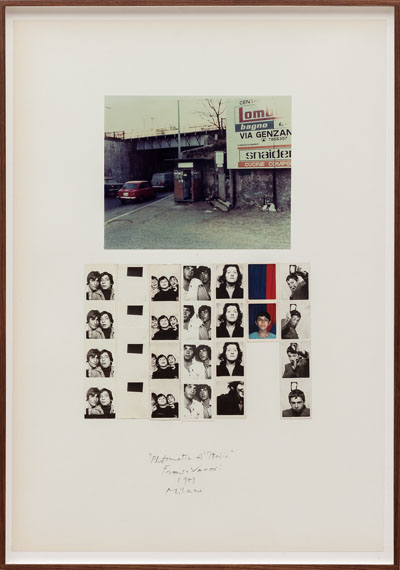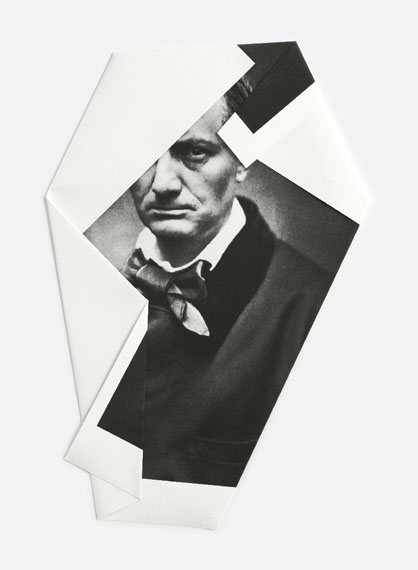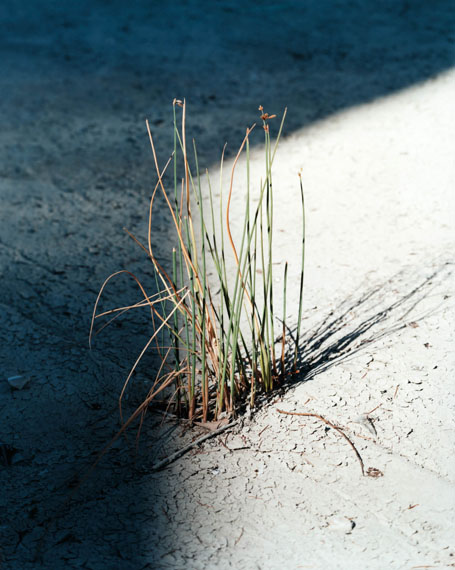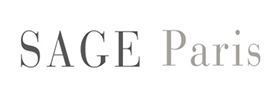
Photomatic d’Italia (Milano), 1973-74
Collage of photo and photostrips on card Framed 70 x 50 cm Signed on recto
Unique piece
© Franco Vaccari / SAGE Paris.
Paris Photo 2017
Piergiorgio Branzi » Alfredo Camisa » Giuseppe Cavalli » Mario Cresci » Mario Gabinio » Paolo Gioli » Guido Guidi » Mimmo Jodice » Nino Migliori » Carlo Mollino » Ugo Mulas » Franco Vaccari »
Fair: 9 Nov – 12 Nov 2017
Wed 8 Nov
Paris Photo
Grand Palais - Prismes
75008 Paris

I Rivolti, Charles Baudelaire, Bergame, 2013 Set of 46 pieces, hand-folded
Archival pigment print
60,5 x 45,5 cm
Unique piece
© Mario Cresci / SAGE Paris.
Paolo Gioli
Paris Photo will be introducing two photographs from the series Sconosciuti (Unknown Persons). Paolo Gioli conceived this work from 1994 to 1995, after he discovered official photo I.D shoots dating from the 1960s in the rubble of a photography studio. On the reverse of these retrieved plate negatives, Paolo Gioli discovered the traces of the previous work made by an anonymous retoucheur.
This series shows three moments to form a single piece: the time of the photograph taken by the first photographer, the time of the image editing and finally the time of the work of the artist. Seeking to give back life to these anonymous figures that were troubled by the work of the retoucheur, Gioli photographed from a reflection highlighting the trace of the craftsman and in a close-up view, these faces skinned by time and handling. This is how Gioli reinvented these portraits and brought new life into them again.
Mario Cresci
I rivolti. Charles Baudelaire is a photographic series made up of 46 copies of Baudelaire’s portrait created by Étienne Carjat in 1878. A copy equivalent to each of the 46 years of his life.
Mario Cresci connects the white surface area of the paper’s reverse side with the printed part of the recto – therefore, it is not only the photographed object that we are interested in, but how the material is going to determine our ability to understand it. The hand-made folding on cotton paper gives each print a three-dimensionality. Thought of as a narrative sequence, this piece depicts the gaze of the poet locked into the paper pleats and always offers Baudelaire’s face a whole new feel.
Franco Vaccari
In the 1960s, Franco Vaccari combined the staging of everyday objects with a question on the langage of surveillance and conformity. His pieces question the spatial, physical and temporal conditions of the sensitive experience. Depicting space left by the object the artist can produce, the artwork becomes with Vaccari dependent on the viewer’s will to participate in the scheme.
The photographs that are today introduced are from the Exhibition in Real Time n.4shown at the Venice Biennale in 1972 and Photomatic d’Italia, a piece made between 1972 and 1973. These Installation artworks establish a system of mixing the artist’s device, the response and the involvement of the viewer. In this case, the viewer is invited in these two installations to photograph himself in a photobooth, sometimes in the museum, sometimes in the street. This exhibition allows in both cases Vaccari to question private and public – private space of the booth, public space of the street, museum; the private and public aspects of our identity.
Guido Guidi
Affected by artists of the Italian Renaissance and inspired by the work of Walker Evans, Lee Friedlander and Italian neorealist photographers, Guido Guidi started working in black and white and created conceptual artworks in the early 1960’s before giving it up in order to devote himself only to color with a large Deardorff view camera.
He then committed himself to vernacular landscape and its transformations, what is now called "peripheral spaces", akin to Stephen Shore or Lewis Baltz with whom he collaborated. It is not monumental spaces that attract him, but "uncodified situations, unclear, open, misunderstood or misconceived", what is beside, above, below what is familiar or day-to-day to ourselves. He insists: "my attention is focused on the landscape when it is seen and lived on daily basis. Simultaneously, I chose to avoid folkloric stereotypes or historical myths, and focus on current simple reality. (...) Nothing is irrelevant. On the contrary, everything is worth the attention."
Also presented on our booth the works of : Piergiorgio Branzi, Alfredo Camisa, Giuseppe Cavalli, Mario Gabinio, Mario Giacomelli, Mimmo Jodice, Nino Migliori, Carlo Mollino and Ugo Mulas. �

Fiume Savio, Cesena,2007
Set of 8 C-Prints on Fujicolor Crystal Archive paper 24,5 x 19,5 cm
Signed and dated verso
Edition of 5 + 2 AP
© Guido Guidi / SAGE Paris.

Sconosciuti, 1995
Gelatin silver print
23,6 x 30 cm
© Paolo Gioli / SAGE Paris.
